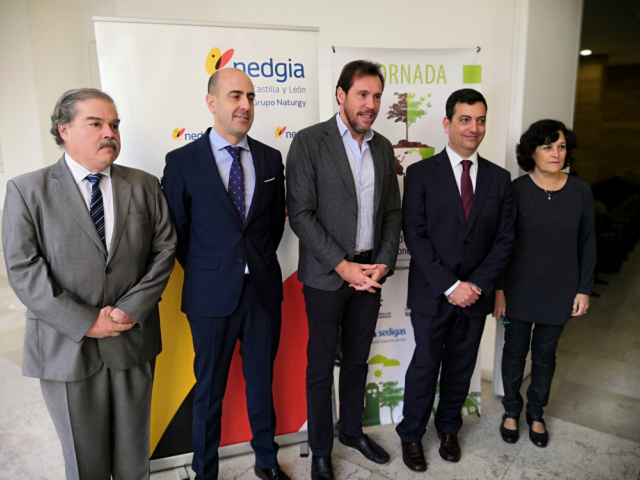The Mayor of Valladolid, Óscar Puente, and the Large-scale Consumption Manager of NEDGIA, Roberto Cámara, officially opened the conference entitled “Switch to Natural Gas in Boiler Rooms at Municipal Facilities” organised by the Spanish Federation of Municipalities and Provinces (FEMP) and the Spanish Gas Association (SEDIGAS) at the Patio Herreriano Museum in Valladolid, which was sponsored by NEDGIA Castilla y León.
In his speech, Óscar Puente said that cities need to adopt strategic plans to improve air quality and promote measures to improve energy efficiency, highlighting that “natural gas can play a decisive role in the transition to a sustainable energy model”. In turn, Roberto Cámara stressed that public authorities have always been committed to reducing energy consumption and using the cleanest energies available, which has led them to opt for natural gas because it is a form of energy that is “environmentally-friendly and offers a stable and affordable price”.
Approximately 50 municipal managers took part in the session at which natural gas was highlighted as the best alternative in terms of ecology and price for meeting the heating demands of public authorities, which are large-scale energy consumers.
Air quality
Air pollution is a recurring problem in Spanish cities, especially larger cities. Pollutant emissions generated by transport and boiler rooms that use polluting fuels have a major effect on the quality of the air breathed in by the public.
Hundreds of facilities still exist in Spain that use polluting alternatives, such as diesel or coal, which would allow us to have cleaner healthier air were they to switch to natural gas. This would also eliminate the noise and jams generated by the transport of fuel in trucks, because natural gas is a continuous supply energy that requires no storage.
The Professor of Applied Physics at the School of Education and Social Work of the University of Valladolid, Victoria Cachorro, spoke about the impact had by the use of fossil fuels on air quality. She stressed that natural gas is the cleanest, most efficient source of energy for generating electricity and that it helps us breathe cleaner air because it reduces the pollutants measured in air quality to near zero. Furthermore, it offers the lowest CO2 emissions per energy unit (KWh) obtained of all the conventional fuels, thereby helping to offset the effects of climate change.
Sustainability and efficiency
The Large-scale Consumption Manager of NEDGIA Castilla y León, Javier de Celis, added that the use of natural gas fosters the sustainability of territories by offering solutions to social issues (affordable energy), economic issues (raises the competitiveness of companies and surrounding activities) and environmental issues (reduces greenhouse gas emissions and improves urban air quality).
He also stressed that natural gas can play a major role in achieving sustainable mobility, with solutions for short and long distance transport that enable cost savings and reduce pollutant emissions.
In turn, the Chairman of the Marcogaz Performance Committee (Technical Association of the European Natural Gas Industry), José Manuel Domínguez, listed the various very high efficiency natural gas technologies being used for air conditioning and hot water production in buildings, from the classic condensing boilers and their hybrids with renewable energies to the newest products and those in development, such as the gas fuel cell.
He added that natural gas is coming from increasingly renewable sources, such as the recycling of urban and farm waste or the transformation of surplus renewable electricity, thereby reducing its net emission of CO2 into the atmosphere. He went on to highlight that the proportion of renewable gas in the natural gas mix will gradually increase, with the goal being for most of the gas consumed to come from renewable sources by 2050.
Municipal best practices
Finally, the public authorities spoke about their experiences in switching the facilities in their municipal buildings to natural gas. The Chief Technical Architect from Edificios Municipales del Ayuntamiento de Segovia, Miguel Ángel Muñoz, and the representative from Agencia Energética Municipal de Valladolid (AEMVA), Macario Olmedo, explained the reasons that led them to opt for natural gas and the positive results they have seen at their facilities.
Presence in Castile-Leon
NEDGIA is the main natural gas distributor in Castile-Leon and provides this energy to over 446,000 supply points in more than 120 towns and cities. The gas distributor of the Naturgy Group in Castile-Leon manages a transportation and distribution network of more than 4,200 kilometres and provides service to almost 555,000 homes, businesses and industries.
